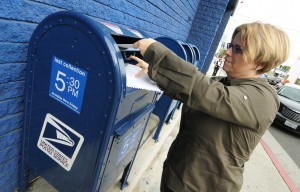Don't have time to listen? Stay with me. Here it is in a nutshell. (Remember, you're currently paying these now. If Brown managed to get his package on the ballot and if voters approved it, you'd keep paying them. If that doesn't happen, they expire.)
3 Tax Extensions Dems Want on the Ballot:
- A surcharge on income tax of .25%. This has already lapsed.
- The retention of a sales tax rate of 6%, currently scheduled to roll back to 5%. (That's the state's portion. Municipalities tack on extra amounts, so you may pay as high as 10% total.)
- A vehicle license fee of 1.15% on the value of your car, scheduled for a reduction to .65%
So, how do you figure out what these are costing you now? Or, put another way, how much will you save if they don't get extended?
1. Income Tax Surcharge
Here's what Jay Chamberlain of the California Department of Finance told me about estimating the amount that the personal income tax surcharge costs you:
"It is generally true that you can calculate your additional tax by multiplying 0.0025 times your taxable income. For some taxpayers who would be nontaxable without the surcharge, the tax increase would be somewhat less."
So let's just say you look at your tax return last year and see that your taxable income, to use a random number, was $50,000.
Multiply that $50,000 by .0025, and you'll find that this particular tax cost you $125.
If your taxable income is double, $100,000, then your liability, of course, doubles for this tax to $250.
2. Vehicle License Fee
In 2009, when the VLF increased from .65 percent to 1.15 percent, the DMV counseled drivers how to figure out how much more they would pay:
Generally the increase is approximately $5.00 per $1000 in vehicle value. For example, a vehicle valued at $5,000 (when purchased) would see an increase of approximately $25.00.
So reverse that process, and figure that your VLF will decrease by $5 per $1000 in vehicle value if the tax extensions don't go through.
The DMV provides a VLF calculator to find out your fee. Because the fee is based on the car's purchase price and depreciated each year according to a pre-set schedule, your VLF goes down as your car gets older.
For an example of the kind of dough the VLF costs, my 1999 New Beetle (hey, I work in public radio, haters) was $41 last year. So personally, the reduction in that particular fee is not something I'm going to join the Tea Party over. But if you own a new, expensive car, the scheduled reduction could be substantial. The fee is listed on your car registration, or again, check out the DMV calculator.
If you're not familiar with the VLF, well, Gray Davis certainly recalls it -- because it recalled Gray Davis. Meaning that an increase in the fee played a big part in the recall of the governor and the election of Arnold Schwarzenegger. Here's John Myers talking about the political powderkeg the fee turned out to be and Davis' take on it after he was ousted:
Listen to John Myers on the politically explosive Vehicle Registration Fee
